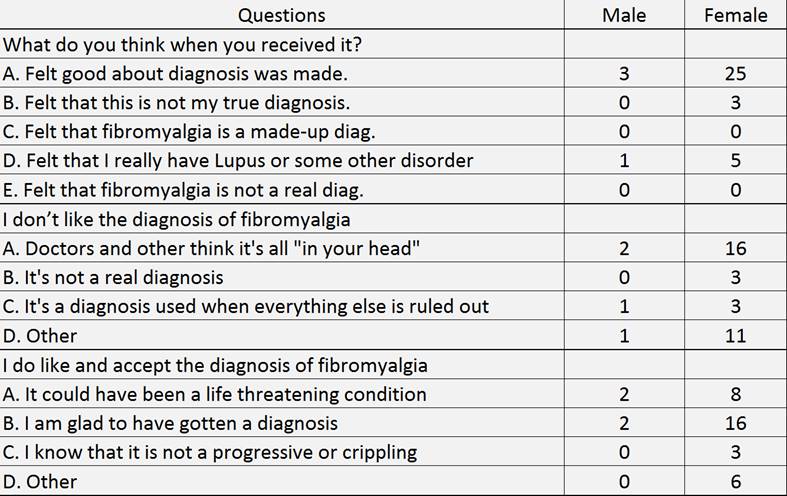Session Information
Date: Tuesday, November 7, 2017
Title: ARHP Fibromyalgia, Soft Tissue Disorders, Regional and Specific Clinical Pain Syndromes
Session Type: ACR Poster Session C
Session Time: 9:00AM-11:00AM
Background/Purpose: In the community, many comments are made about fibromyalgia that are not accurate, such as, it is a made-up illness; a ‘garbage’ diagnosis; everything else needs to be excluded to diagnose someone with fibromyalgia; it is an unscientific term; or it is a name used for autoimmune conditions, such as lupus, when the doctor is uncertain. We asked patients with fibromyalgia in a rheumatology office practice what they thought when they were given the diagnosis of fibromyalgia by a rheumatologist.
Methods: 37 patients with clinically diagnosed fibromyalgia were given an in-office questionnaire. The questions included whether fibromyalgia was a diagnosis that made them feel good and that the doctor understood that was the cause of their symptoms; whether they felt that the diagnosis was not accurate; whether they felt that fibromyalgia is a made-up, unscientific term; whether they felt that they really had lupus or some other disorder; and whether they felt that fibromyalgia was not a real diagnosis.
Results: Patients generally accept the diagnosis of fibromyalgia but are concerned that physicians and non-physicians may think that it is “all in their heads”. See table.
Conclusion: The great majority of fibromyalgia patients in a rheumatology office practice felt good that a diagnosis was made to explain their symptoms. Only a minority thought that the diagnosis was either inaccurate or that the term “fibromyalgia” was an unscientific one and not a real diagnosis.
The biggest problem accepting the diagnosis is that many patients think that doctors and others feel that the symptoms are ‘all in your head’.
The word is spreading about fibromyalgia, such that many patients now accept the diagnosis and feel more comfortable that something more serious and progressive is not present. Though fibromyalgia can be challenging to treat, at least in a rheumatology office practice patients do feel more comfortable given that diagnosis.
A few patients will push back, and these can be a source of stress for the patient and for medical practitioners. The ACR 2010 guidelines for the diagnosis, which can be summarized in a one-page sheet that the patient and practitioner fill out, can assist in verifying the diagnosis. Through scientific research, and also advertising FDA approved drugs to patients, the diagnosis of fibromyalgia appears to be generally accepted.
To cite this abstract in AMA style:
Katz RS, Polyak JL, Leavitt F. Most Fibromyalgia Patients in a Rheumatology Office Practice Accept the Diagnosis of Fibromyalgia [abstract]. Arthritis Rheumatol. 2017; 69 (suppl 10). https://acrabstracts.org/abstract/most-fibromyalgia-patients-in-a-rheumatology-office-practice-accept-the-diagnosis-of-fibromyalgia/. Accessed .« Back to 2017 ACR/ARHP Annual Meeting
ACR Meeting Abstracts - https://acrabstracts.org/abstract/most-fibromyalgia-patients-in-a-rheumatology-office-practice-accept-the-diagnosis-of-fibromyalgia/

